
My fighter checkout was in the Curtiss P-40 Warhawk. When I pushed that throttle forward for the very first time, I watched in complete horror as that long pointy nose swung to the side—there was a lot more torque with the P-40 than what I was used to in the AT-6!1 ended up zigzagging down the runway trying to correct my rudder and stick mistakes. In all honesty, I wasn't that impressed with the P-40 at all. Not because it tried to kill me that first time I] took off in one, but because about the only thing it could do well in combat was dive. It took forever for the Allison-powered P-40s to struggle to 16,000 feet, and believe me, we weren't able to get much higher than that. By the time! got comfortable in the P-40 and with visions of white sand beaches and tropical Pacific weather, I was told] would be sent to North Africa. Before I knew it, 1 was half a world away in Casablanca and a new member of the 325th Fighter Group known as the Checkertails.
Joining the Checkertail Clan Early P-40 combat
By May of 1943, I was flying combat with the 317th Fighter Squadron at the controls of a P-40F; now, that airplane was a real dog” to go into combat with! It had a Rolls-Royce Merlin engine that replaced the Allison, but it still couldn't get us much past 18,000 feet. Most of our early missions were escorting B-26, B-25, and A-20 twin-engine bombers. I recall one mission where we were supposed to rendezvous with some South African A-20 Havocs and it was darn near impossible to keep up with them. They were faster than we were as our tongues were hanging out trying to keep up with them. Even at full throttle, the P-40 lagged behind. Like I said, it was a dog, but in a turn chasing tails with an enemy fighter, it was a real scrapper.
This story is from the November - December 2022 edition of Flight Journal.
Start your 7-day Magzter GOLD free trial to access thousands of curated premium stories, and 9,000+ magazines and newspapers.
Already a subscriber ? Sign In
This story is from the November - December 2022 edition of Flight Journal.
Start your 7-day Magzter GOLD free trial to access thousands of curated premium stories, and 9,000+ magazines and newspapers.
Already a subscriber? Sign In

Keeping 'em Flying!- The new generation of warbird pilots, restorers and mechanics
The new generation of warbird pilots, restorers and mechanics. Nearly 80 years after the end of World War II, the fighters, bombers, and trainers that defended freedom continue to enthrall and inspire audiences at airshows, thanks to generations of warbird pilots, maintainers, restoration specialists and collectors. In our September, 2022 issue we introduced you to the young warbird pilots, maintainers and restorers who are already beginning to displace more "experienced" warbird fliers and fixers.

The Corsair Maker- Bringing the Vought Corsair to the fleet was a daunting challenge that spanned nearly three years.
When the first production Corsairs exited the Stratford factory in June 1942, Guyton, as seen here, was tapped to manage the flight and production test program. Armament was improved to six wing-mounted .50s, displacing the wing fuel tanks now placed forward of the cockpit which necessarily was moved rearward by 32 inches. Overall length was increased, armor plate added, landing, arresting and tail gear improved, aileron control enhanced, and a new version of the R2800 engine was incorporated. But those significant improvements unearthed numerous idiosyncrasies that would take an extended period to make the Corsair acceptable for carrier operations
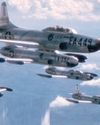
STARFIRES Over Korea
F-94 pilots tangle with MiGs
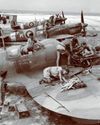
Training Mission
BY THE TIME THIS TRAINING SCENE WAS RECORDED in Canne, Italy, in July 1944, Allied Yugoslavian airmen had several years of experience working side by side with the RAF.
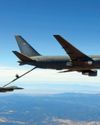
KC-46A PEGASUS
Next generation aerial refueler
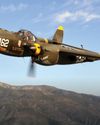
"SATAN'S ANGELS" ACE - Tales from a P-38 pilot in the South Pacific
\"AS A KID GROWING UP on the bow of my father's tugboat, hauling oil from Seattle to Alaska, I had a lot of time on my hands.
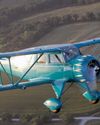
WACO YKC - Stunning and Ultra Rare Golden Age Cabin Flier
BETWEEN THE IMPLEMENTATION of the Air Commerce Act of 1926 and December 31, 1948, all U.S. registered flying machines sported an N-number, much as they do today, the \"N\" being an internationally recognized identifier for the United States. During that period, however, an additional letter-identifier followed the \"N.\" Depending on their category, they were registered in the NC (Commercial), NG (Glider), NL (Limited), NR (Restricted, usually meaning race airplanes), NS (State government), and, finally, NX (experimental).
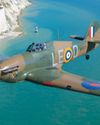
BADER'S HURRICANES
Double amputee fighter ace Douglas Bader and his Battle of Britain Hurricanes
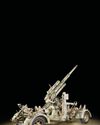
Scourge of the Allied Fighters
IT HAD TO BE THE MOST HELPLESS FEELING in the world: you're at 25,000 feet over Europe knowing that your primary function is to drop bombs-or flying escort for the bombers while being a slow-moving target for some of the world's finest shooters. However, you have John Browning's marvelous .50 caliber invention to give some degree of protection. Unfortunately, you're absolutely helpless against flak. Piloting and gunnery skills play no role in a game where sheer chance makes life and death decisions. For that reason, the Krupp 88 mm Flak 18/36/37 AA cannon could be considered WW II's ultimate stealth fighter. You never saw it coming.
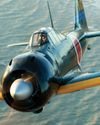
ZERO MYTH, MYSTERY, AND FACT
A test pilot compares the A6M5 Zero to U.S. fighters